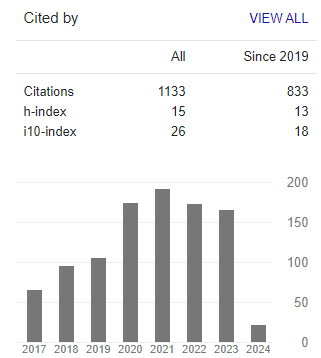 Volume 3, Issue 4
Volume 3, Issue 4
Impact Factor 3.582
1)Anna Freud and early intervention/education: What can NAEYC and DEC learn?
Author’s Detail:(1)Jerry Aldridge, Ed.D., Professor Emeritus University of Alabama at Birmingham (2)Jennifer L. Kilgo, Ed.D., University Professor University of Alabama at Birmingham (3)Grace Jepkemboi, Ph.D., Assistant Professor University of Alabama at Birmingham (UAB) (4)Rose Rutto-Korir, Ph.D., Senior Lecturer and Graduate Studies Coordinator Moi University of Kenya
ABSTRACT
Anna Freud was the administrator of programs for young children with special needs for most of her adult life. After her death, the National Association for the Education of Young Children (NAEYC) and the Division of Early Childhood (DEC) of the Council for Exceptional Children (CEC) separately developed recommended practice guidelines for professionals and paraprofessionals working with young children (birth through age eight). The purpose of this article is to describe the major recommendations of NAEYC and DEC as compared to the writings and research of Anna Freud. While many of Anna Freud’s ideas and practices have been incorporated into NAEYC guidelines known as the Developmentally Appropriate Practice in Early Childhood Programs Serving Children from Birth through Age 8 and the DEC document published as the DEC Recommended Practices: A Comprehensive Guide for Practical Application in Early Intervention/Early Childhood Special Education, Anna Freud’s contributions in general early childhood education and early intervention/early childhood special education have gone unnoticed. Parallels in these two documents and Anna Freud’s research are highlighted and recommendations are made for using Anna Freud’s writings as a resource in future discussions concerning recommended practices in the fields of general and special early childhood education.
Key words: Anna Freud, developmentally appropriate practice, DEC recommended practices, collaboratio
[Download Full Paper] [Page 01-07]
=================================================================================
2)Relevance of prosocial behaviours to rural entrepreneurship development in Nigeria
Author’sDetail:(1)Olowookere Elizabeth Ibukunoluwa(2)Elegbeleye Ayotunde Oluwadamilola
Department of Psychology Covenant University Ota, Ogun State, Nigeria
ABSTRACT
With the current scourge of unemployment and the poverty condition in Nigeria, rural entrepreneurship has had a cushion effect on the depressing economic condition of the nation. Rural entrepreneurship represents the informal sector of the economy which is characterised by small scale businesses involving petty traders and artisans. Interestingly, most research efforts on business development and effectiveness have focused mainly on businesses within the formal sector with no consideration for those in the informal sector. Although prosocial behaviours have been considered as crucial to the success of any business endeavour, these behaviours were investigated and labelled as Organizational Citizenship Behaviour (OCB) within the formal sector with no reference to rural entrepreneurship. Hence, this paper introduced the concept of Entrepreneurial Prosocial Behaviours (EPB) as those types of behaviours essential for the development of rural entrepreneurship. It examined the nature of rural entrepreneurship in Nigeria, the theoretical explanation of entrepreneurial prosocial behaviours, its dimensions and relevance to the success of rural entrepreneurship in Nigeria. This paper concluded that prosocial behaviours are crucial to the development of small business units and recommended that such be cultivated among rural entrepreneurs. Further, this paper recommended that empirical research be conducted to validate Entrepreneurial Prosocial Behaviours (EPB) as a construct.
Key Words: Prosocial Behaviours, Rural Entrepreneurship, Informal Sector, Development, Nigeria
[Download Full Paper] [Page 08-15]
=================================================================================
3)Advances in the Use of ICT and its Impact on Human Resources Development in Tertiary Institutions in Cross River State
Author’s Detail:(1)Ebuara, V. O. Ph.D-Department of Educational Administration & Planning University of Calabar, Cababar, Cross River State, Nigeria
(2)Maurice Ayodele Coker, Ph.D-Department of Political Science-University of Calabar, Calabar Cross River State, Nigeria
ABSTRACT
This study examined the level of the use of ICT in tertiary educational institutions in Cross River State and the effect it has on the development of human resources. The study observed that the pace of growth of digital data networks have been phenomenal. This development has been possible due to the educational transformation of the society. This has impacted on every aspect of human endeavour. The study employed a survey design using ex-post –facto and guided by 3 research hypothesis of 36- item questionnaire known as Advances in the use of ICT and impact on Human Resources development (AIIHRDG) was constructed to elicit information from respondents. Independent T-Test statistics was used to analyze the data generated in the study. The finding revealed a significant relationship between growth of ICT and development of human resources. Based on the findings conclusions was drawn and recommendations were made that the curriculum of tertiary institutions should be radically overhauled to make ICT focused. Tertiary institutions should be fully automated and functional.
Keywords: Information communication technology, tertiary institutions, human resources development, mobile phones, information
[Download Full Paper] [Page 16-22]
=================================================================================












 ----Indexed In---
----Indexed In---
 ----Indexed In---
----Indexed In---




